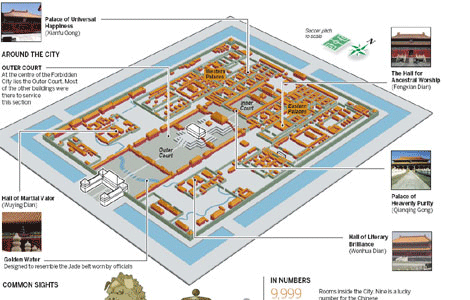Internet needs to be 'tamed'
Updated: 2011-09-09 13:38
By Shen Yi (China Daily European Weekly)
Governments around the world face a challenge in a networked world
|
 |
A recent Reuters report says there are "signs that the ruling (China's) Communist Party wants to tame the explosion of freewheeling microblogs".
The writer got at least one aspect right - "tame" means coming up with certain regulations to govern the flow of information and behavior in cyberspace.
The proliferation of Internet use has posed a serious challenge to all the actors in a networked world since the late 1990s. More than promoting the free flow of information in a borderless virtual space, the global cyberspace also brings pirated or toxic information including pedophilia and rumors.
Controlling this means creating the necessary legal avenues to regulate the code of conduct in cyberspace, especially for governments of sovereign states.
The United States has already set several samples on how to tame the Internet to minimize negative effects. In 2010, Wikileaks, the famous whistleblower website, tried to cooperate with mainstream media like the New York Times to publish thousands of war blogs and internal cables from the Department of State.
According to reports on politico.com, executives of The Times went to the White House to discuss coverage; and the White House encouraged such "responsible" action. And after leaks of the information, which exposed that thousands of civilians died in Iraq due to US military action, the US government launched a series of actions to punish the founder and supporters of Wikileaks.
Companies were required to cut off the Domain Name Service (DNS), credit services and even the bank accounts of people involved. According to the US Patriot Act, the Department of Justice and other departments sent national security letters to companies including Twitter and Godaddy, requiring them to provide information on those who supported Wikileaks, including their access history, time, IP address and credit card number.
All these actions in dealing with Wikileaks are examples of how to regulate the Internet, and even the mainstream media in the US. US Secretary of State Hillary Clinton clearly implied in her second address on "Internet freedom" - "Internet Rights and Wrongs: Choices & Challenges in a Networked World" - regulating the Internet and information flow in cyberspace is one of the most important goals of governments in today's world. Regulating the Internet to ensure people benefit from the latest developments in IT while minimizing the possible negative effects has become one of the most important tasks for many countries. In Thailand, Saudi Arabia, France, Germany and other countries, governments want to regulate the Internet by establishing a legal system to regulate the action of public exchange and sharing of information in cyberspace based on their own circumstances.
So if Reuters did take note of all this, it should not be surprised by the latest signals sent by Beijing. The real point is not whether the government should regulate the Internet, but how to regulate it.
As to the traditional mainstream media, it is important not to have double standards while discussing the issue. It is not hard to find the existence of such double standards: non-Western countries, especially those with different domestic political structures or ideologies, are easy targets of criticism when they try to build their own system to regulate the cyberspace.
One example is the attitude of Britain and China on the issues. In dealing with the recent London riots, Prime Minister David Cameron mentioned plans to temporarily shut down some Internet functions that played an important role in "mobs" exchanging information and encouraging people to take to the streets. And RIM, the producer of BlackBerry cellphones, announced that it would cooperate with the UK government to deal with the riots, which implies the possibility of sharing communication information encrypted by the BlackBerry system. Though that's "taming" the Internet, it has attracted little criticism compared to what is happening in China.
At the same time, it is also important to remember that complexity is one of the most important characteristics in China of the opinion environment in cyberspace, which means it would be easy to pick up certain aspects, fragments from millions of bits of information published every day as evidence to "prove" certain points based on stereotypes.
Two recent cases are an article published by Foreign Policy in July, and the one published by Times of India in September: the former said that "China's Weibo (the micoblogging site of Sina.com, considered the Chinese version of Twitter) is the world's best rumor-mongering machine ever", while the latter implies the development of the Internet represented by new media including "Weibo" promote a certain version of the Arab Spring in China. If both these articles are correct, we may reach the conclusion: the main driving force of a "revolution" is rumor in cyberspace. That's the risk: if you just want to "prove" certain prejudged points, definitely you will find lots of evidence to support your point. Finally, you get a conclusion with solid evidence, but it is ridiculous.
In China, a long time ago, when there was no such thing as the Internet or even before the birth of modern technology, ancient wisdom is reflected in a famous story: Groping in the dark. It tells people that it would be stupid or dangerous to reach a conclusion before you know all aspects of the facts. In China, the country as a whole is trying to adapt to the challenge and opportunity raised by the development of the Internet which means all parties can take the opportunity to improve their life, to push forward reform, and have better governance.
Normal users of Weibo have been doing their utmost to quell the effects of rumor; officials are learning to get positive information, including from critics, advice on public policies, anti-corruption and crisis managements to improve their work. There are at least tens of thousands of accounts owned by different departments,officials and representatives of Chinese and other governments.
Some of them are active, some don't run very well. But the point is that the development continues, and nearly everyone is trying their best to adapt to the challenges. In some ways, it could be tempting to conclude that all of them are trying to tame the Internet but it would also be noted the objective result is that no one can completely control the process which can lead to an improvement both of cyberspace and governance in China.
In a networked world, it is necessary for the government to learn to regulate cyberspace so that people have a safer and more efficient environment to enjoy all the benefits brought by the development of IT. But few governments can do the job independently. Cooperation is needed that will ensure the development of the Internet will benefit as many as possible.
The author is a lecturer at the Department of International Politics at Fudan University. The opinions expressed in this article do not necessarily reflect those of China Daily.
E-paper

Unveiling hidden treasures
The Forbidden City, after the Great Wall, is the most recognized tourist site in China.
Short and sweet
Game for growth
Character reference
Specials

China at her fingertips
Veteran US-China relations expert says bilateral ties have withstood the test of time

The myth buster
An outsider's look at china's leaders is updated and expanded

China in vogue
How Country captured the fascination of the world's most powerful fashion player
